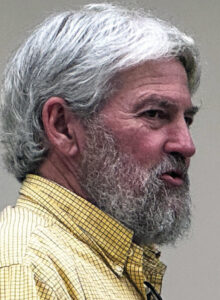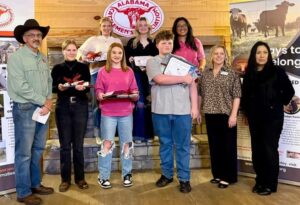Forestry commission gives out free trees March 2-3
Franklin County folks have the chance to celebrate Arbor Day in a special way this week – with free trees, to be given out by the Alabama Forestry Commission.
Free trees will be on offer at the commission office, 1004 Highway 36 in Russellville, March 2 from 9 a.m. to noon and March 3 from 1–4 p.m.
“In the past, we’ve usually gone to Red Bay City Hall for the giveaway,” explained Alex Horn, forest management specialist for the Alabama Forestry Commission. “This year, we decided to work out of our office since it’s more centrally located in the county. Some of the trees are donated by us, and others are donated by TVA.”
Information sheets will be available to help people understand best practices for planting the trees.
Horn said all the trees will be native species and include flowering dogwood, Eastern redbud, elderberry, American hornbeam, red maple, common persimmon, bald cypress, tulip poplar, scarlet oak, Chickasaw plum, American plum, Southern crabapple, native pecan, Mexican plum, swamp white oak, sugar maple, river birch, northern catalpa, sweet shrug, white fringe tree, oakleaf hydrangea, dwarf red buckeye, American hazelnut and Clethra.
“We have a saying – that you want to have the right plant in the right place,” explained Kerry Steedley, regional Extension agent for forestry, wildlife and natural resources. “You want to consider the environment, whether it’s well-drained or retains more water.”
Steedley said trees native to the Southeast are “really good at weathering.” This area has periods of both rain and drought.
She said it’s good to go ahead and think about possible desired locations for a tree, considering conditions and preferences of the tree, as well as personal preferences, such as wanting color in a certain area.
Steedley said, especially in the first year, it’s important to make sure to water the tree during any periods of drought to help it get off to a good start.
“A few years down the road, it wouldn’t need as much maintenance as a lot of the ornamental trees that aren’t native to our area,” Steedley explained.
Those who would like to test their soil can do so for free through the Extension. “It’s a good way to see if your soil has the nutrients it needs to grow healthy trees,” she added.
Steedley said a lot of people think a hole for a tree has to be deep, but that’s often not the case, noting sometimes a bowl shape is better, not requiring as much depth. She explained the roots need room to spread out.
Other considerations she mentioned include whether a particular tree needs bright sunlight or whether it’s more shade-tolerant.
“Trees have a lot of benefits,” she pointed out, “from providing erosion control in landscaping to providing food, as well as shelter for wildlife and helping support the local population of insects and wildlife.”








